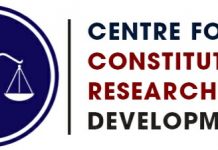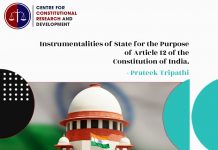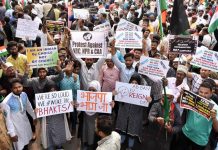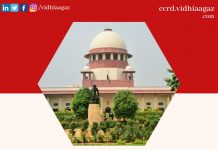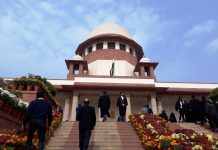HISTORY OF THE POLITICAL CRISIS
The appalling events that took place after the state assembly election in Maharashtra posed a major threat to the democracy as the news reports abashed the political parties of their alleged involvement of buying and selling of lawmakers, and the brazen attempt to subvert political and ethical norms. Some have even fathomed that India tote with the world’s largest democracy is losing its integrity. The homeostasis of Indian Polity was disturbed, and the Constitution was fumbled with.
The facts leading to the unbecoming events in a nutshell are that there was a pre-poll alliance between BJP and Shiv Sena. The former couldn’t form the government immediately after the declaration of the results as its alliance with the latter broke down. No party was able to manoeuvre the majority in the House, thus the Governor recommended President’s Rule, and a presidential proclamation was made on 12.11.19. News spread about the grand alliance of the Maha Vikas Aghadi. On 23rd November 2019, the President’s Rule was revoked and BJP was invited to form the government by the Governor. Keeping aside the political power play, it would be more relevant to reflect upon the constitutional implications.
CONSTITUTIONAL IMPLICATIONS OF THE POLITICAL CRISIS
This constitutional crisis raised questions on the unscrupulous powers exercised by the Governor under the constitution. Like a big brother stepped in the Supreme Court of India – after a writ petition[1] which was filed by the Maha Vikas Aghadi[2] – to awaken the constitutional morality from the nightmares of the political drama. True that the boundaries between the jurisdiction of courts and parliamentary independence are contentious, this situation is not new to the Indian judiciary and was handled with utmost regard to the rule of law.
The petition before the Supreme Court sought for a declaration that the Governor’s action was unconstitutional, arbitrary, therefore void ab initio. The crucial prayers were with regard to the interim measures seeking the court’s direction to summon a special session with the only agenda being administering oath to the MLAs, immediately followed by the holding of a floor test. Further, this was also sought to be video recorded following various decisions of the SC.[3]
The case for the Petitioners was argued by renowned senior advocates, Mr. Kapil Sibal and Dr. A.M Singhvi, who vehemently submitted that the Governor’s acceptance of BJP’s proposal to form the government with a post-poll alliance with a faction of NCP reeked of malice, and the Governor turned a blind eye to the legality of the alliance. Amidst these fiery arguments, the learned Solicitor General prima facie raised an objection as to the interference of the House proceedings by the Court as per Article 212 of the Constitution. Further, the Governor was satisfied with the material placed before him and wasn’t obligated to conduct a roving enquiry. Various other submissions were made with regard to the Governor’s independence, and the Court’s lack of authority under Article 32 of the Constitution.
The Court felt that this political drama raised “questions concerning important constitutional issues touching upon the bulwark of our nation”[4], and also the need to “uphold democratic values and foster constitutional morality.”[5] Albeit, aware of the institutional boundaries, the court placed reliance on its own previous decision which held that the Supreme Court being “the sentinel on the qui vive of the Constitution is under the obligation to see that democracy prevails…”[6], the Court felt the clamant exigency to prevent the delay of floor test to protect democratic values, failure of which would pave way for horse-trading. It is also pertinent to note that not a year has elapsed since the Karnataka Political power play, wherein the SC jumped in and emphasised the requirement of imbibing constitutional morality by the constitutional functionaries.
This situation is not new to the Indian Democracy or its Constitution. The imperativeness of a floor test was challenged in various cases before the courts, and there is a galore of judgments following the Supreme Court holding that “it is the Legislative Assembly that represents the will of the people and not the Governor.”[7] The Supreme Court nonetheless in the present case was equipped with a catena precedents ordering an emergent floor test notwithstanding its interference with the House proceedings.[8] Most importantly, the application of Article 212 to the present case was shied away from on the ground that neither any proceedings of the Legislature nor an act of any officer or member of the legislature has been made the subject matter of the petition.
The Court requested the Governor to conduct a floor test and laid down a procedure for the same. The Governor is ought to follow such order not because he is bound by the SC[9] but it is the constitutional mandate that he cannot refuse the formation of the government by a majority claim. Being a constitutional functionary having utmost regard to constitutional morality, it is incumbent upon the Governor that this action should be taken without any undue delay which would pave way for horse-trading. The Constitution does not envisage unscrupulous discretion to the Governor.
[1] Shiv Sena & Ors. v. Union of India, WP No. 1393 of 2019, available at: https://www.sci.gov.in/pdf/ORD_2.pdf.
[2] The post poll alliance formed by Shiv Sena, NCP and INC.
[3] Jagadambika Pal v. Union of India, (1999) 9 SCC 95; Union of India v. Harish Chandra Singh Rawat,
[4] Shiv Sena & Ors. v. Union of India, WP No. 1393 of 2019, para 17.
[5] Ibid.
[6] Union of India v. Shri Harish Chandra Singh Rawat, (2016) 16 SCC 744, para 8.
[7] S.R. Bommai v. Union of India, (1994) 3 SCC 1.
[8] Jagadambika Pal v. Union of India, (1999) 9 SCC 95; Anil Kumar Jha v. Union of India, (2005) 3 SCC 150; Union of India v. Harish Chandra Singh Rawat, (2016) 16 SCC 744; Chandrakant Kavlekar v. Union of India, (2017) 3 SCC 758; G. Parameshwar v. Union of India, (2018) 16 SCC 46.
[9] S.R. Bommai v. Union of India, (1994) 3 SCC 1. (the foundation for limitng the governor’s discretionary power was laid down); See also Dhananjay Mahapatra, “Karnataka governor bound by Supreme Court order to call Congress-JD(S)?” Economic Times, May 16, 2018, https://economictimes.indiatimes.com/news/politics-and-nation/karnataka-governor-bound-by-supreme-court-order-to-call-congress-jds/articleshow/64185216.cms


